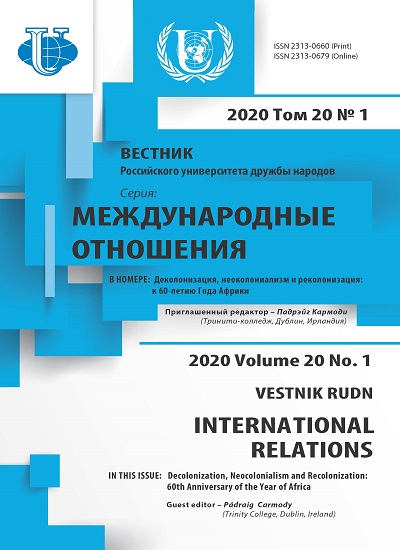South Africa’s Shrinking Sovereignty: Economic Crises, Ecological Damage, Sub-Imperialism and Social Resistances
- Authors: Ngwane T.1, Bond P.2
-
Affiliations:
- University of Johannesburg
- University of the Western Cape
- Issue: Vol 20, No 1 (2020): Decolonization, Neocolonialism and Recolonization: 60th Anniversary of the Year of Africa
- Pages: 67-83
- Section: THEMATIC DOSSIER
- URL: https://journals.rudn.ru/international-relations/article/view/23323
- DOI: https://doi.org/10.22363/2313-0660-2020-20-1-67-83
- ID: 23323
Cite item
Full Text
Abstract
The development of contemporary South Africa political economy occurred within the context of a global capitalist order characterized by increasingly unequal political and economic relations between and within countries. Before liberation in 1994, many people across the world actively supported the struggle against apartheid, with South Africa’s neighbouring states paying the highest price. The ‘sovereignty’ of the apartheid state was challenged by three processes: first, economic, cultural and sporting sanctions called for by Nelson Mandela’s African National Congress and other liberation movements, which from the 1960s-80s were increasingly effective in forcing change; second, solidaristic foreign governments including Sweden’s and the USSR’s provided material support to overthrowing the Pretoria Regime; and third, military defeat in Angola and the liberation of neighbouring Mozambique (1975), Zimbabwe (1980) and Namibia (1990) signalled the inevitability of change. But that state nevertheless maintained sufficient strength - e.g. defaulting on foreign debt and imposing exchange controls in 1985 - to ensure a transition to democracy that was largely determined by local forces. Since 1994, the shrinkage of sovereignty means the foreign influences of global capitalism amplify local socio-economic contradictions in a manner destructive to the vast majority of citizens. This is evident when considering economic, ecological, geopolitical and societal considerations.
Keywords
About the authors
Trevor Ngwane
University of Johannesburg
Email: trevorngwane@gmail.com
PhD in Sociology, Senior Lecturer in Sociology, University of Johannesburg, and President of the South African Sociological Association Johannesburg, South African Republic
Patrick Bond
University of the Western Cape
Email: pbond@mail.ngo.za
PhD in Economic Geography, Professor, School of Government Capetown, South African Republic
References
- Alternative Report on Africa. (2019). First Issue Terms of Reference for Country Studies. Unpublished paper. Dakar: ENDA, February
- Amin, S. (1990). Delinking. London: Zed Books
- Averbach, M. (1936). A Comment on Trotsky’s Letter to South Africa. Revolutionary History, 4 (4), 131-133
- Bond, P. & Galvin, M. (2019). Water, Food and Climate Commoning in South African Cities. In: Vivero-Pol, J.L. & Ferrando, T. (Eds.). Routledge Handbook of Food as a Commons. London: Routledge. P. 231-248
- Bond, P. & Malikane, C. (2019). Inequality Caused by Macro-Economic Policies during Overaccumulation Crisis. Development Southern Africa, 36 (6), 1-18. doi: 10.1080/0376835X.2019.1701416
- Bond, P. (2014). Elite Transition. London: Pluto Press
- Fine, B. & Rustomjee, Z. (1996). The Political Economy of South Africa. Johannesburg: Wits University Press
- Fine, B. (2008). The Minerals-Energy Complex is Dead: Long Live the MEC? Amandla Colloquium. URL: https://eprints.soas.ac.uk/5617/1/MineralEnergyComplex.pdf (accessed: 02.02.2020)
- Keynes, J.M. (1933). National Self-Sufficiency. The Yale Review, 22 (4), 755-769
- Kuhn, A. & Wolpe, A.M. (Eds.). (1978). Feminism and Materialism. London: Routledge and Kegan Paul
- Magubane, B. (2001). The Social Construction of Race and Citizenship in South Africa. Working paper, UN Research Institute for Social Development, Geneva. URL: http://www.unrisd.org/unrisd/website/projects.nsf/ (httpAuxPages)/F1E2C56AA5442BD7C1256BDE002FBDC9?OpenDocument (accessed: 07.02.2020)
- Marini, R.M. (1965). Brazilian Interdependence and Imperialist Integration. Monthly Review, 17 (7), 14-24.
- Masondo, D. (2007). Capitalism and Racist forms of Political Domination. Africanus, 37 (2), 66-80.
- Mbeki, T. (2004). Two Worlds: Two Economies. South African Labour Bulletin, 28 (2), 10-11.
- Ngwane, T. (2019). Insurgent Democracy: Post-Apartheid South Africa’s Freedom Fighters. Journal of Southern African Studies, 45 (1), 229-245.
- Spaull, N. (2013). South Africa’s Education Crisis. Centre for Development and Enterprise Working Paper, Johannesburg, October.
- Wolpe, H. (1972). Capitalism and Cheap Labor Power in South Africa: From Segregation to Apartheid. Economy and Society, 1, 425-456.
Supplementary files










